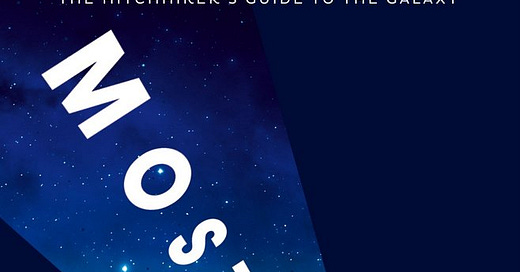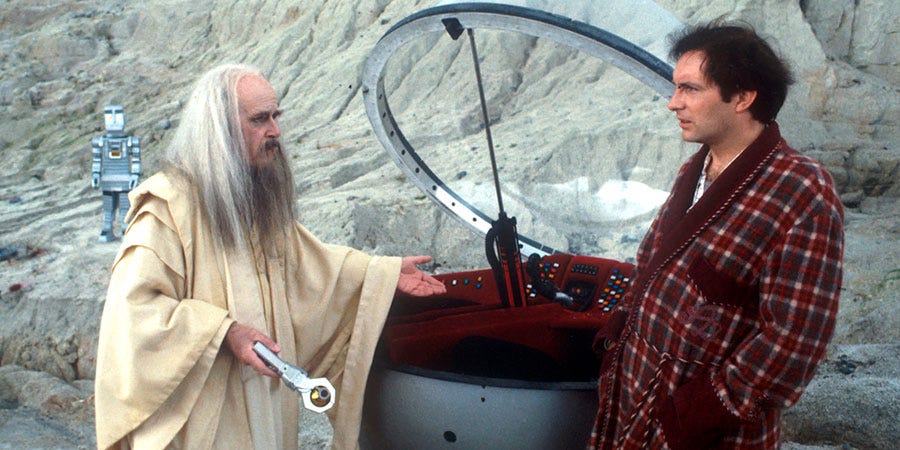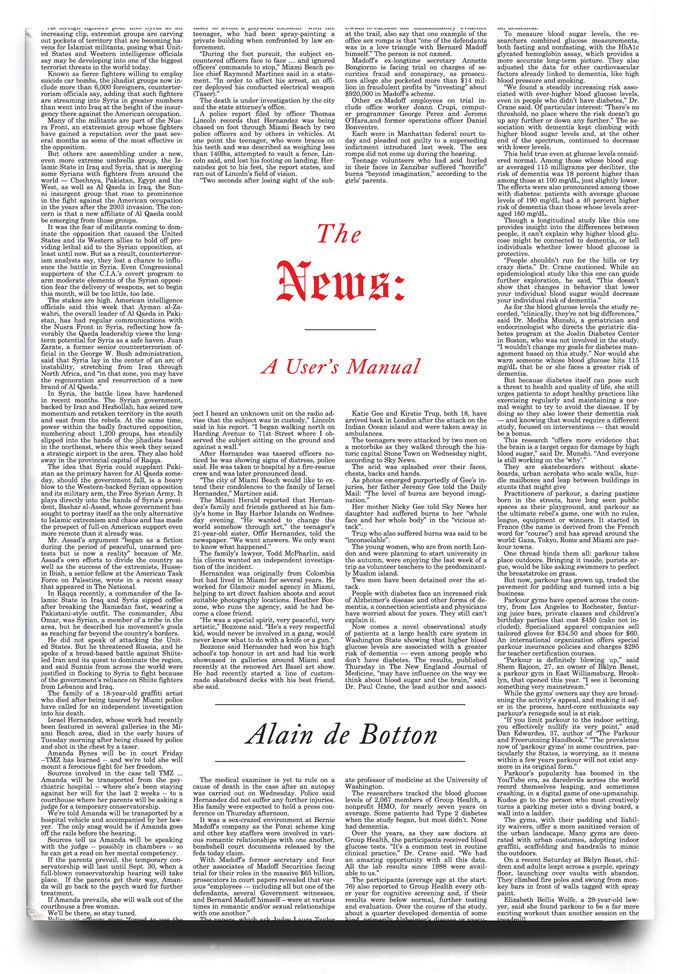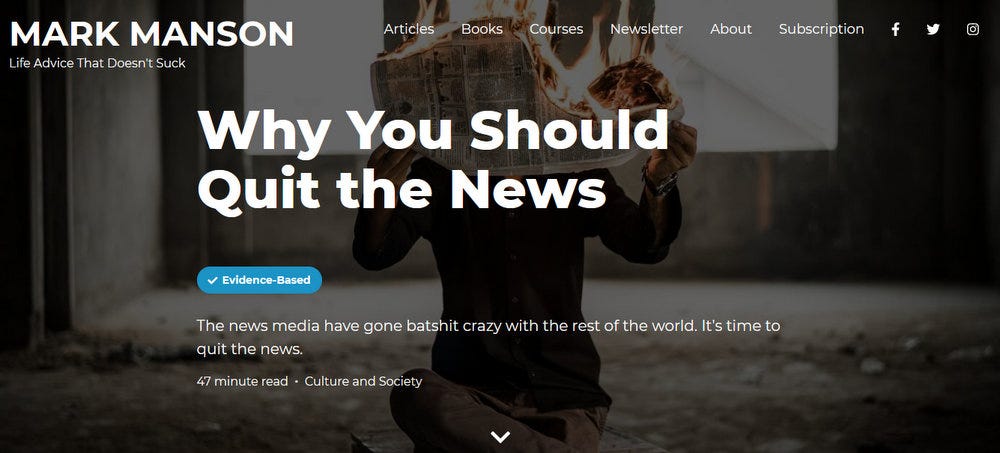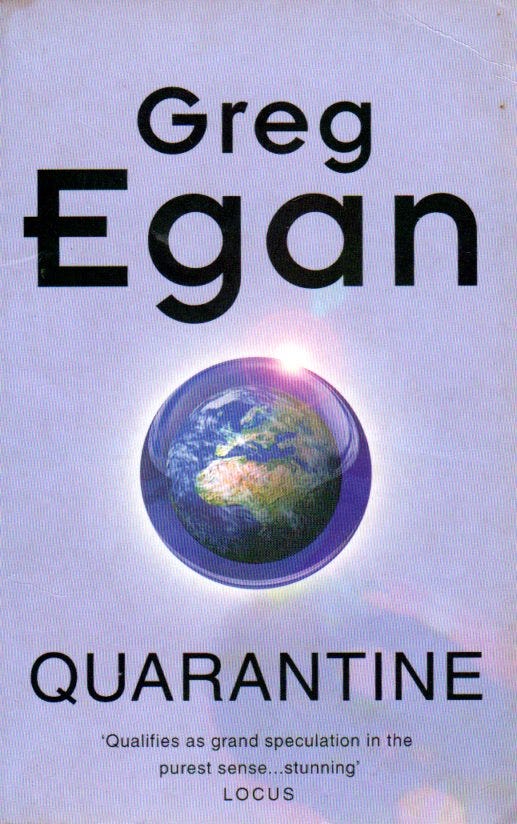The Unexamined News Is Not Worth Believing
Lessons in feeling OK from the frontlines of philosophy.
Hello again! Welcome to Everything Is Amazing, a newsletter about curiosity. It was recently described by a writer friend as “the most entertaining and thoughtful midlife crisis I’ve read for decades.” So that’s nice (I guess?).
Ensure you’re watching me mentally come apart in realtime by subscribing below:
In today’s edition, some really bad news - and what we can do about it.
In his comic scifi novel Mostly Harmless, the late Douglas Adams makes a pointed attack on the modern news cycle in the form of a joke:
“Nothing travels faster than the speed of light with the possible exception of bad news, which obeys its own special laws. The Hingefreel people of Arkintoofle Minor did try to build spaceships that were powered by bad news but they didn't work particularly well and were so extremely unwelcome whenever they arrived anywhere that there wasn't really any point in being there.”
As a seasoned satirist he considered everything worthy of amiable ridicule, and beyond his love of environmental issues, his near-universal scepticism - which extended to mocking his own work - makes it hard to know what his true beliefs were.
(But also, why do we care? It’s interesting that folk keep trying to unearth his views, as if the only way to render wisdom acceptable is to assign its creator palatable politics.)
Like all good satirists, Douglas Adams used humour to ask some really awkward questions. That quote tackles a complicated idea in a simple form that anyone will laugh at - and since laughter is the best attention-focusing tool ever devised, that idea stuck.
It’s a perfect piece of modern philosophy.
Please stop here and take a second to look at yourself. What just happened, when you read the word “philosophy”?
Did your spirits deaden a little, as dusty old white-bearded gentlemen self-importantly bickered their way across your imagination, using language so impenetrable that you only understood one word in ten? Did you imagine filthy garrets at the tops of crumbling university buildings, piles of yellowing books nobody will ever read, questionable personal hygiene, ragged clothing and tedious arguments in the street that fritter away the chance to do anything genuinely useful with the day?
It’s interesting we now have such a fusty stereotype for philosophers (at least in my corner of the world) and yet the publishing category of “self-help” is one of the fastest-growing in the marketplace. We’re desperate to improve ourselves - and at the same time, so quick to write off ideas on the subject that have been around for centuries, sometimes millenia.
At least, that used to be the case. Now you have Seneca and Marcus Aurelius repackaged by Ryan Holiday and Tim Ferriss, Mark Manson cheerleading Kant to his millions of readers, and who knows what else is out there beyond the laughably narrow limits of my own reading.
There are also the people doing modern philosophical work who successfully dodge the stereotype. Take the topic of shame: touched upon in a rather muddled way by Aristotle (“aidōs” - the sense of shame), it’s now the focus of work by philosopher Martha Nussbaum and numerous books & TED talks by research professor Brené Brown . If you think the study of ideas in general has become unfashionable, look at the amount of shared articles from Aeon (“a magazine of ideas and culture”) and Brain Pickings (“an inventory of the meaningful life”).
I’d say philosophy is alive and well under all sorts of new guises, wearing different clothes and racking up millions of new fans on Instagram or Netflix - most of whom probably think “philosophy” went out with the dinosaurs.
(My recommended entry point to understanding the classic arguments in a form that never makes you feel like you’re being schooled: Jostein Gaarder’s Sophie’s World, and more recently, Eric Weiner’s The Socrates Express.)
Then there’s Douglas Adams, who made thought-experiments hilarious. Who in their least generous moments hasn’t thought we’d all be better off if all the useless idiots in this world could be tricked onto a Golgafrinchan Ark Fleet Ship B and fired into the sun? (Come on. Admit it.)
Or there’s this gem:
“For instance, on the planet Earth, man had always assumed that he was more intelligent than dolphins because he had achieved so much - the wheel, New York, wars and so on - whilst all the dolphins had ever done was muck about in the water having a good time. But conversely, the dolphins had always believed that they were far more intelligent than man - for precisely the same reasons.”
Yet I love his Bad News Powered Spaceship the best, because there’s no better metaphor for why the world feels such a mess these days.
Alain de Botton has a lot to say about the news. He’s another popular modern writer translating ancient ideas into a modern format, and in his book The News: A User’s Manual, he describes the modern news cycle as “the determined pursuit of the anomalous.”
More about that in a moment, but first, let’s engage in some shabby, mean-spirited low humour.
Alain De Botton is (in my opinion) a brilliant, thoughtful man whom (in a lot of other people’s opinion) comes across as exactly the kind of stuffy academic we all would like to hear less of. Take this lively criticism from writer Charlie Brooker, creator of Black Mirror, who describes De Botton as:
“...a slapheaded, ruby-lipped pop philosopher who’s forged a lucrative career stating the bleeding obvious in a series of poncey, lighter-than-air books aimed at smug Sunday supplement pseuds looking for something clever-looking to read on the plane - yet if you pick up one of his books and read it cover to cover, you'll come away with less insight into the human condition than if you'd worked your way through a copy of Mr Tickle instead.”
Reader, I confess I laughed (with a pained expression, because I really enjoy De Botton’s work). It illustrates what often happens with self-identifying philosophers - they get labelled as peddlers of pretentious drivel.
I can’t really fault Brooker because it’s his job to make people giggle, and he himself has brilliantly ridiculed the way the news works:
Anyway - here’s Alain De Botton talking about the news at Google. (It’s possible you feel the same way as Brooker about his demeanour, but what he’s saying is well worth listening to.)
Since that talk’s nearly an hour long, and since our time in this world (and the wordcount of this newsletter) is cruelly limited, let’s return to his main quote again: “the determined pursuit of the anomalous.”
De Botton’s main point is that it’s easy to assume the news is always representative of the state of the world - and in doing so, fail to understand why it isn’t. The news is a kind of extremophile, something that usually only thrives in extreme environments. Only the weirdest, strangest, happiest, saddest, most exciting and most horrific things are most-favoured by its headlines, because that’s what cuts through the digital noise facing us every day. Even quality sources of news fall prey to this, because at a fundamental level, everyday, “boring” reality is mostly unnewsworthy (unless it’s being reported by a really superb writer).
I would suggest that nobody would click a story that read “For the 286th time this year, nothing particularly dramatic happened in [place name] and more or less everyone was, on average, somewhat fine really.”
For a more damning critique of the global news cycle, here’s writer Mark Manson tackling the subject at length (and using language you’d never hear from De Botton).
Manson is one of my favourite online thinkers because of the way he tackles his subjects: bravely and irritatingly. His writing style is conversational and peppered with f-bombs, and every article is designed to wind up a large slice of his readers. If you’ve seen his posts shared on Facebook (where they rack up millions of clicks), the sharer is usually yelling “YES! THIS!” or “UGH I FIND THIS SO OFFENSIVE”. He’s immensely provocative - and that gives him a reach that most news services would envy.
So it’s interesting when you see some of his arguments are for reclaiming the middle ground in everything. Take this defense of being average, later turned into a key chapter of his bestselling book The Subtle Art Of Not Giving A F*ck.
I really value Mark’s work, partly because I so frequently object to it in some way - either the tone gets my British back up (all that swearing, for example, good lord), or I find some of his conclusions about the world initially unpalatable. What’s happening in these cases - and also when I agree with him - is that he’s making me think. Riling people up without giving them something of value to argue about is social vandalism, but when it’s done specifically to make them think, it’s a thing to treasure.
For this reason, I’d class Mark Manson as a modern philosopher as well - although he prefers the label “life advice that doesn’t suck.” (Also, he’d say “who gives a f*** what you think of me?” Fair point, I guess.)
Returning to Douglas Adams - the reason his Bad News joke has stayed relevant is because of the way the news reaches us.
Even if (and this is a huge “even if”) we were consuming news stories that fairly summed up the entirety of what’s going on in the world today, we’d still have a tendency to cherry-pick the awful stuff and share it on social media.
Welcome to the first, and most important, of the cognitive biases I want to talk about in this newsletter in relation to curiosity:
“There is ample empirical evidence for an asymmetry in the way that adults use positive versus negative information to make sense of their world; specifically, across an array of psychological situations and tasks, adults display a negativity bias, or the propensity to attend to, learn from, and use negative information far more than positive information.”
(From “Not all emotions are created equal: The negativity bias in social-emotional development” - Amrisha Vaish, Tobias Grossmann and Amanda Woodward.)
Well, dammit.
Not only are we exhausted from all the depressing news out there, we’re also hooked on it. It seems we can’t stop obsessing over what’s crappy and awful, even if it’s wildly unrepresentative of the amount of crappy, awful things out there.
Here, then, is a potential way we can use curiosity to counteract our negativity bias - and those small rectangles of metal, plastic and glass that beam the worst of the woes of the world into our eyes every day.
Gary Arndt is one of the most well-travelled people I know - and in 2010, he summed up his travels in an article at Tim Ferriss’s blog called 20 Things I've Learned From Traveling Around the World for Three Years.
Here’s the first of his points:
“People are generally good. Many people are afraid of the world beyond their door, yet the vast majority of humans are not thieves, murderers or rapists. They are people just like you and me who are trying to get by, to help their families and go about living their lives. There is no race, religion or nationality that is exempt from this rule. How they go about living their lives might be different, but their general goals are the same.”
Are you suppressing an eye-roll right now? Does it sound like an obvious, dull, lacking-in-excitement conclusion to come to?
Maybe it sounds like one of those platitudes that powers a thousand Inspirational Quotes on Instagram - except, it isn’t. It’s a pithy summary of Gary’s real-life experiences. He went out into the world, met a huge number of people in a vast array of places, and his considered conclusion is hey, most people are OK.
Did you hope for something a bit more newsworthy there?
Hm.
Here’s an idea, then. Imagine a middle ground - a “Goldilocks zone,” to borrow from science - of expectations about the world. A state between the depths of hopelessness and the continual disillusionments of idealism. You’re aware that everything isn’t irredeemably ruined, but you’re also in no danger of sinking into despair because everything isn’t perfect. Much is in need of repair, sure. But this current state of unfixedness feels manageable.
Imagine occupying this tolerable middle ground. A place that’s bearable, even hopeful. An everything-is-okayness.
(I might need to change the title of this newsletter if I continue with this argument.)
So, regarding how things actually are right now, maybe they’re just okay. Not worthy of a news headline, but certainly okay enough to get out of bed and crack on with your day. (Well, maybe things are an unusual amount out of whack right now, yes. But beyond that…)
And maybe an antidote to the constant anxiety the news brings us is to fight the urge to have an opinion about everything.
There’s a scifi novel by Australian writer Greg Egan that works as a hilarious (if complicated) metaphor about this, the kind Douglas Adams would be proud of. It goes as follows:
Some time in the near future, our Solar System is abruptly surrounded by…some kind of bubble. No light can get in or out, so we look up into the night sky and see no stars, just our neighbouring planets against a terrifying background of nothingness. Humanity panics for a while (clearly it hasn’t read the reassuring cover of The Guide), then settles back into its customary state of arguing with itself.
The novel’s something of a techno-thriller, so I’ll skip that bit of it. Here’s the relevant bit:
It turns out that compared to the wider universe, humans are really special. And it’s all about quantum physics - which modern science accepts as a solid working model of how the universe works, despite how mindbogglingly, pants-explodingly weird it is.
According to quantum physics, once you get down to a certain level of smallness (an insane level of smallness, where individual parts of atoms can be seen), something called probabilistic reality seems to kick in. Instead of things down there being in a reassuringly unambiguous state we’d recognise (“that chair is by the window”), they exist as a series of probable states - as in “this particular particle of light (photon) is mostly at point A, but there’s a small but not impossible chance that it could be at point B too, meaning that in a small amount of cases it can magically appear there, even though there’s a seemingly impassable barrier in the way”.
It’s like saying “that chair is almost certainly by the window but it could be on the roof of that passing bus instead.”
(This really is a working scientific principle, yes, and there are machines that depend on it.)
This bizarre “cloud of what-ifs” is called a wavefunction - a smear of possibilities that forms the bedrock of everything. And it seems that in our natural world, wavefunctions exist until they’re observed. When they’re seen, all those possibilities collapse down to one certainty that we’re clearly looking at. The chair is here, not over there, because I’m looking at it. D’uh.
So Egan (who is a maths enthusiast) imagines a universe of alien races that comfortably exist not as we do, but as a steady blur of probabilities. As full-sized uncollapsed wavefunctions. And it’s only the human race that has the ability to turn those possibilities into certainties by the act of observation.
So humanity looks out into space through its telescopes, observes the universe, and unwittingly forces it all into a single wavefunction-collapsed state. An opinion, if you like.
In doing so, it commits xenocide on a scale that even Thanos would flinch at. Entire races cease to exist in the blink of an eye.
In response: the bubble. The aliens decide to quarantine humanity from everyone else - to stop its “opinion” destroying half the universe in an act of mindless observational imperialism.
This is the kind of wild idea that is such a gift from the best science fiction. Totally barmy, of course, but grounded in hard science. And like China Mieville’s tale of Besžel and Ul Qoma, maybe it’s lunacy with the core of a useful idea.
If ideas are like wavefunctions, why are we in such a hurry to collapse them into opinions?
What if we renew our focus on what’s in front of us, tune out the clickbait, continually search for better questions to ask, embrace a little more uncertainty, and fight the pressure to have a firm stance on absolutely everything?
(There are certainly many cases where the conclusions of others should carry weight in your life. Try robbing a bank and you’ll be confronted with a few of them. But an opinion on everything? Why are we taught that’s a good way to behave? Why is it so uncharismatic to say, “I don’t know” these days, especially on Twitter or Facebook?)
Instead, we could hone our curiosity skills and follow in the footsteps of perhaps the most famous philosopher of them all - a man who, like Douglas Adams, rarely gave any clue to his true beliefs, and is best-known for asking questions until he’d irritated just about everyone.
(A lovely quote from The Socrates Express here, where Eric quotes Professor Jacob Needleman: “Our culture has generally tended to solve its problems without experiencing its questions.” Whew.)
If we do that, maybe, beyond the hasty, negatively-skewed, anxiety-inducing blizzard of extreme headlines hitting us every day, we can tentatively piece together answers that might initially look as banal and disappointingly pedestrian as “people are generally good” - but actually fit the world around us for a change?
Well, it’s an idea.
Additional notes:
1) While I was putting this piece together, Mark Manson sent out an edition of his weekly newsletter that opened like this:
The Most Important Trait in the 21st Century - A few days ago, I was having a conversation with a friend about the many people we knew in our lives who seemed to be stagnant - i.e., not changing, not progressing, not accomplishing their goals - and the many people we knew who were not stagnant - i.e., moving up in the world, making things happen, reinventing themselves and their lives.
We asked each other: what was the difference between these two groups of people?
One answer continued to pop up for me: intense curiosity. The defining trait of progressing in the 21st century appears to be a driving curiosity about anything and everything.
No argument from this newsletter, sir.
2) Gary Arndt is now running a fascinating bite-sized podcast called Everything Everywhere Daily, and publishing the episode shownotes on Substack. It’s a really great listen. Check it out.
Images: Thomas Charters; Kyle Glenn; Markus Spiske

